Recommended Books
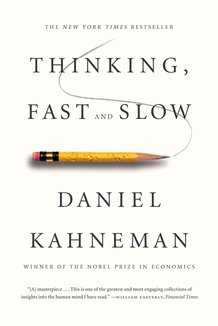
Thinking, Fast and Slow
Author:
Daniel Kahneman
ISBN 13:
978-0374533557
*Major New York Times Bestseller *More than 2.6 million copies sold *One of The New York Times Book Review's ten best books of the year *Selected by The Wall Street Journal as one of the best nonfiction books of the year *Presidential Medal of Freedom Recipient *Daniel Kahneman's work with Amos Tversky is the subject of Michael Lewis's best-selling The Undoing Project: A Friendship That Changed Our Minds In his mega bestseller, Thinking, Fast and Slow , Daniel Kahneman, world-famous psychologist and winner of the Nobel Prize in Economics, takes us on a groundbreaking tour of the mind and explains the two systems that drive the way we think. System 1 is fast, intuitive, and emotional; System 2 is slower, more deliberative, and more logical. The impact of overconfidence on corporate strategies, the difficulties of predicting what will make us happy in the future, the profound effect of cognitive biases on everything from playing the stock market to planning our next vacation―each of these can be understood only by knowing how the two systems shape our judgments and decisions. Engaging the reader in a lively conversation about how we think, Kahneman reveals where we can and cannot trust our intuitions and how we can tap into the benefits of slow thinking. He offers practical and enlightening insights into how choices are made in both our business and our personal lives―and how we can use different techniques to guard against the mental glitches that often get us into trouble. Topping bestseller lists for almost ten years, Thinking, Fast and Slow is a contemporary classic, an essential book that has changed the lives of millions of readers.
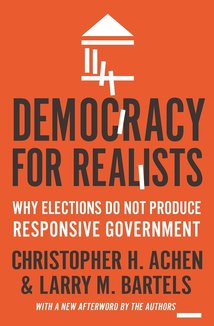
Democracy for Realists: Why Elections Do Not Produce Responsive Government (Princeton Studies in Political Behavior)
Authors:
Christopher H. Achen
,
Larry M. Bartels
ISBN 13:
978-0691178240
Why our belief in government by the people is unrealistic―and what we can do about it Democracy for Realists assails the romantic folk-theory at the heart of contemporary thinking about democratic politics and government, and offers a provocative alternative view grounded in the actual human nature of democratic citizens. Christopher Achen and Larry Bartels deploy a wealth of social-scientific evidence, including ingenious original analyses of topics ranging from abortion politics and budget deficits to the Great Depression and shark attacks, to show that the familiar ideal of thoughtful citizens steering the ship of state from the voting booth is fundamentally misguided. They demonstrate that voters―even those who are well informed and politically engaged―mostly choose parties and candidates on the basis of social identities and partisan loyalties, not political issues. They also show that voters adjust their policy views and even their perceptions of basic matters of fact to match those loyalties. When parties are roughly evenly matched, elections often turn on irrelevant or misleading considerations such as economic spurts or downturns beyond the incumbents' control; the outcomes are essentially random. Thus, voters do not control the course of public policy, even indirectly. Achen and Bartels argue that democratic theory needs to be founded on identity groups and political parties, not on the preferences of individual voters. Now with new analysis of the 2016 elections, Democracy for Realists provides a powerful challenge to conventional thinking, pointing the way toward a fundamentally different understanding of the realities and potential of democratic government.
Find on:
 Amazon
Amazon
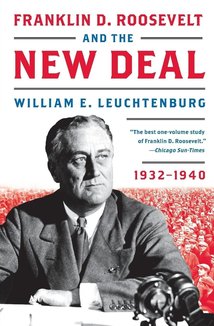
Franklin D. Roosevelt and the New Deal: 1932-1940
Author:
William E. Leuchtenburg
ISBN 13:
978-0061836961
When the stability of American life was threatened by the Great Depression, the decisive and visionary policy contained in FDR's New Deal offered America a way forward. In this groundbreaking work, William E. Leuchtenburg traces the evolution of what was both the most controversial and effective socioeconomic initiative ever undertaken in the United States—and explains how the social fabric of American life was forever altered. It offers illuminating lessons on the challenges of economic transformation—for our time and for all time.
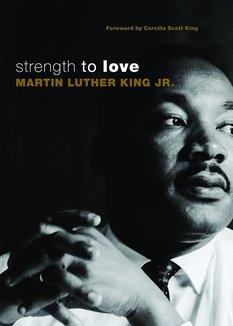
Strength to Love: Gift Edition
Author:
Martin Luther King Jr.
ISBN 13:
978-0800697402
Explore Dr. Martin Luther King's always relevant wisdom in this comprehensive, must-read narrative addressing civil rights and social justice. "If there is one book Martin Luther King, Jr. has written that people consistently tell me has changed their lives, it is Strength to Love." So wrote Coretta Scott King. "I believe it is because this book best explains the central element of Martin Luther King, Jr.'s philosophy of nonviolence," she continued. "His belief in a divine, loving presence that binds all life." It is impossible to separate King's religious views from his views on societal change, which makes this a timely read when religious discussion is often left out of the public square. Strength to Love is more than a blueprint, it is a template for personal authenticity in a time when social and economic change depend on personal integrity. The insight, luminously conveyed in this classic text hints at a personal transformation at the root of social justice. Dr. King states, "By reaching into and beyond ourselves and tapping the transcendent moral ethic of love, we shall overcome these evils." In these short meditative and sermonic pieces, some of them composed in jails and all of them crafted during the tumultuous years of the civil rights struggle, Dr. King articulated and espoused in a deeply personal compelling way his commitment to justice and to the intellectual, moral, and spiritual conversion that makes his work as much a blueprint today for Christian discipleship as it was then. Individual readers, as well as church groups and students will find in this work a challenging yet energizing vision of God and redemptive love.
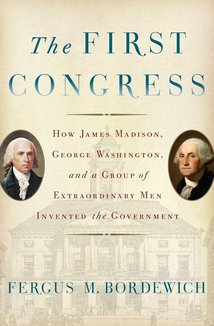
The First Congress: How James Madison, George Washington, and a Group of Extraordinary Men Invented the Government
Author:
Fergus M. Bordewich
ISBN 13:
978-1451691931
The little known story of perhaps the most productive Congress in US history, the First Federal Congress of 1789–1791. The First Congress was the most important in US history, says prizewinning author and historian Fergus Bordewich, because it established how our government would actually function. Had it failed—as many at the time feared it would—it’s possible that the United States as we know it would not exist today. The Constitution was a broad set of principles. It was left to the members of the First Congress and President George Washington to create the machinery that would make the government work. Fortunately, James Madison, John Adams, Alexander Hamilton, and others less well known today, rose to the occasion. During two years of often fierce political struggle, they passed the first ten amendments to the Constitution; they resolved bitter regional rivalries to choose the site of the new national capital; they set in place the procedure for admitting new states to the union; and much more. But the First Congress also confronted some issues that remain to this day: the conflict between states’ rights and the powers of national government; the proper balance between legislative and executive power; the respective roles of the federal and state judiciaries; and funding the central government. Other issues, such as slavery, would fester for decades before being resolved. The First Congress tells the dramatic story of the two remarkable years when Washington, Madison, and their dedicated colleagues struggled to successfully create our government, an achievement that has lasted to the present day.